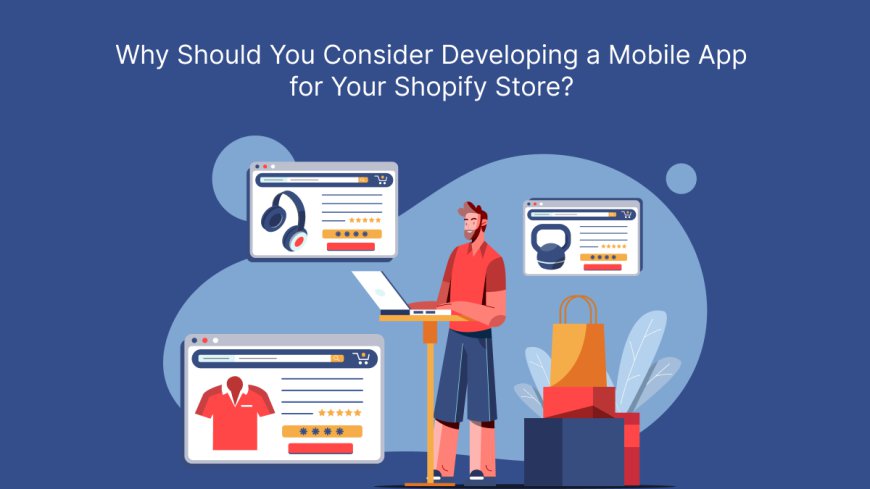Why Should You Consider Developing a Mobile App for Your Shopify Store?
Discover the benefits of developing a mobile app for your Shopify store. Enhance customer engagement, streamline the shopping experience, increase sales, and build brand loyalty. A dedicated app can transform your online business, providing a competitive edge in today’s mobile-driven market.

In the evolving world of e-commerce, businesses are continually looking for innovative ways to enhance customer engagement and drive sales. With the rise of mobile shopping, developing a mobile app for your Shopify store app is becoming increasingly essential. Here are compelling reasons why you should consider creating a mobile app for your online business.
1. Growing Mobile Usage
Recent statistics show that over half of all e-commerce sales come from mobile devices. As consumers increasingly rely on their smartphones for shopping, having a mobile app provides a dedicated platform for reaching these users. A mobile app ensures that your store is accessible anytime and anywhere, allowing customers to shop at their convenience. By catering to the growing mobile audience, you position your brand for increased visibility and sales.
2. Enhanced User Experience
A well-designed mobile app can significantly improve the user experience compared to a mobile website. Apps offer faster loading times, smoother navigation, and offline capabilities. Users can easily browse products, access their accounts, and complete transactions with just a few taps. A seamless and intuitive interface encourages longer browsing sessions, leading to higher conversion rates.
3. Increased Customer Engagement
Mobile apps allow for more direct and meaningful engagement with your customers. Through features like push notifications, you can alert users about promotions, new product launches, and special events in real time. Personalized notifications can enhance user engagement, reminding them of items in their cart or offering tailored discounts based on their shopping habits. This ongoing communication helps keep your brand top-of-mind and encourages repeat visits.
4. Personalization Opportunities
One of the standout features of a mobile app is the ability to collect and analyze user data to create personalized experiences. By tracking user behavior, such as browsing history and purchase patterns, you can offer tailored recommendations and promotions. This level of personalization not only improves customer satisfaction but also increases the likelihood of conversions. When customers feel understood and valued, they are more likely to return to your store.
5. Streamlined Checkout Process
A significant barrier to online shopping is the checkout process. Complicated or lengthy checkout experiences can lead to cart abandonment. A mobile app can streamline this process by offering features like guest checkout, saved payment information, and auto-fill options. By minimizing friction during checkout, you can reduce cart abandonment rates and boost overall sales.
6. Building Brand Loyalty
A mobile app provides a platform for creating and nurturing customer loyalty. By integrating loyalty programs, users can easily track their rewards, access exclusive offers, and receive notifications about special promotions. This engagement fosters a sense of community around your brand, encouraging repeat purchases and long-term customer relationships. Loyal customers are more likely to advocate for your brand, leading to organic growth through word-of-mouth.
7. Competitive Advantage
In a crowded e-commerce market, having a mobile app can set you apart from competitors who only offer a mobile website. An app demonstrates that your business is modern, tech-savvy, and committed to providing a top-notch customer experience. This competitive edge can be especially valuable in niche markets where differentiation is crucial.
8. Access to Analytics
Mobile apps provide valuable insights into user behavior through analytics tools. You can track key metrics such as user engagement, sales performance, and customer preferences. This data helps you make informed decisions about marketing strategies, product offerings, and overall business direction. By understanding how customers interact with your app, you can continually optimize the user experience.
9. Offline Access
Unlike mobile websites, which require an internet connection, mobile apps can provide some level of functionality offline. Users can browse previously loaded content or access specific features without being connected to the internet. This convenience can enhance user experience and make your app more appealing to customers who may be in areas with poor connectivity.
Conclusion
Developing a shopify store mobile app for your Shopify store is not just a trend; it’s a strategic move that can significantly enhance customer engagement, streamline the shopping experience, and boost sales. With growing mobile usage, improved user experience, personalized interactions, and the ability to gather valuable data, a mobile app positions your brand for long-term success in the competitive e-commerce landscape. By investing in a mobile app, you take a proactive step toward meeting the needs of today’s consumers and driving your business forward. Embrace the opportunity to elevate your Shopify store and create a shopping experience that resonates with your customers.

 appboon
appboon